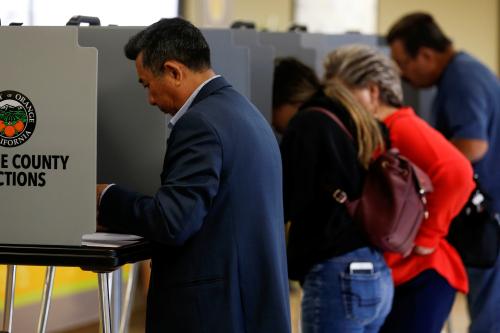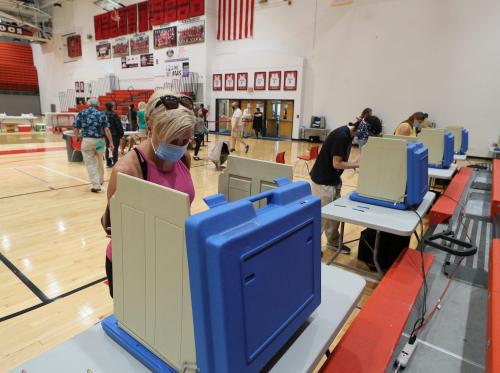Four years ago, white women without college degrees stood shoulder to shoulder with white non-college men even though it was the first time in history that a woman candidate for president headed a major party ticket. This year, however, they are breaking ranks. If Donald Trump loses the 2020 election, white women without college degrees will be a big part of the reason.
A look at a new Washington Post/ABC News poll of two key midwestern states, Wisconsin and Minnesota, has evidence of a shocking turnaround.
In 2016, Donald Trump carried Wisconsin by 0.8% in the popular vote and lost Minnesota by the surprisingly small margin of 1.5%. Now, according to this new survey, he trails Joe Biden among likely voters by 6 points in Wisconsin and by 16 points in Minnesota.
To understand what’s going on, let’s zero in on white voters without college degrees, who made up 37% of the vote in Minnesota and 47% in Wisconsin in 2016, according to the exit polls. (We now know that these shares almost certainly underestimated the weight of white non-college voters in these states and elsewhere.)
White voters in Minnesota without college degrees, 2016 and 2020
| 2016 | 2020 | ||||
| Trump | Clinton | Trump | Biden | Trump Change | |
| Overall | 60 | 33 | 51 | 48 | -9 |
| Men | 63 | 30 | 60 | 37 | -3 |
| Women | 58 | 36 | 40 | 59 | -18 |
Source: Washington Post/ABC News
White voters in Wisconsin without college degrees, 2016 and 2020
| 2016 | 2020 | ||||
| Trump | Clinton | Trump | Biden | Trump Change | |
| Overall | 62 | 34 | 54 | 44 | -8 |
| Men | 69 | 26 | 65 | 32 | -4 |
| Women | 56 | 40 | 45 | 52 | -11 |
Source: Washington Post/ABC News
These numbers speak for themselves. Trump’s support among white voters without a college education has dropped in Minnesota and Wisconsin compared to 2016, and most of the change is attributable to shifting sentiments among non-college women. The gender gap among non-college whites has widened since 2016 from 5 to 20 points in Minnesota and from 13 to 20 points in Wisconsin.
The Washington Post/ABC News survey helps us understand the reasons for widening differences between men and women without college degrees. Compared to men, non-college women are less likely to believe that Donald Trump can handle the country’s problems better than Joe Biden, as the following tables indicate.
White non-college voters in Minnesota: Who can handle . . . . . better, Trump or Biden?
| Trump | Biden | |||
| Issue | Men | Women | Men | Women |
| The economy | 66 | 41 | 32 | 48 |
| Coronavirus outbreak | 61 | 41 | 39 | 59 |
| Crime and safety | 59 | 36 | 36 | 51 |
| Racial equality | 55 | 39 | 33 | 59 |
| Political violence | 60 | 35 | 40 | 51 |
| Health care | 58 | 36 | 39 | 59 |
Source: Washington Post/ABC News
White non-college voters in Wisconsin: Who can handle . . . . better, Trump or Biden?
| Trump | Biden | |||
| Issue | Men | Women | Men | Women |
| The economy | 71 | 46 | 26 | 48 |
| Coronavirus outbreak | 61 | 41 | 31 | 51 |
| Crime and safety | 66 | 45 | 31 | 50 |
| Racial equality | 59 | 35 | 39 | 51 |
| Political violence | 66 | 41 | 30 | 50 |
| Health care | 62 | 41 | 32 | 52 |
Source: Washington Post/ABC News
This poll provides even more evidence for the argument, first made in these pages by Morley Winograd and Mike Hais, that the movement of women away from the Republican party might presage the first “gender realignment” in American history. Whether this turns out to be true remains to be seen, of course. But unless President Trump can turn around the negative judgment of his performance that such large numbers of white women without college degrees have formed, he will not get their votes in November. And if he does not, it is hard to see how he can fill the gap their diminished support will create, because his relentlessly base-oriented strategy has won him few new friends.
The Brookings Institution is committed to quality, independence, and impact.
We are supported by a diverse array of funders. In line with our values and policies, each Brookings publication represents the sole views of its author(s).







Commentary
Will white women without college degrees torpedo President Trump’s reelection?
September 16, 2020